Ideology and Ideological State Apparatuses by Althusser- Explained
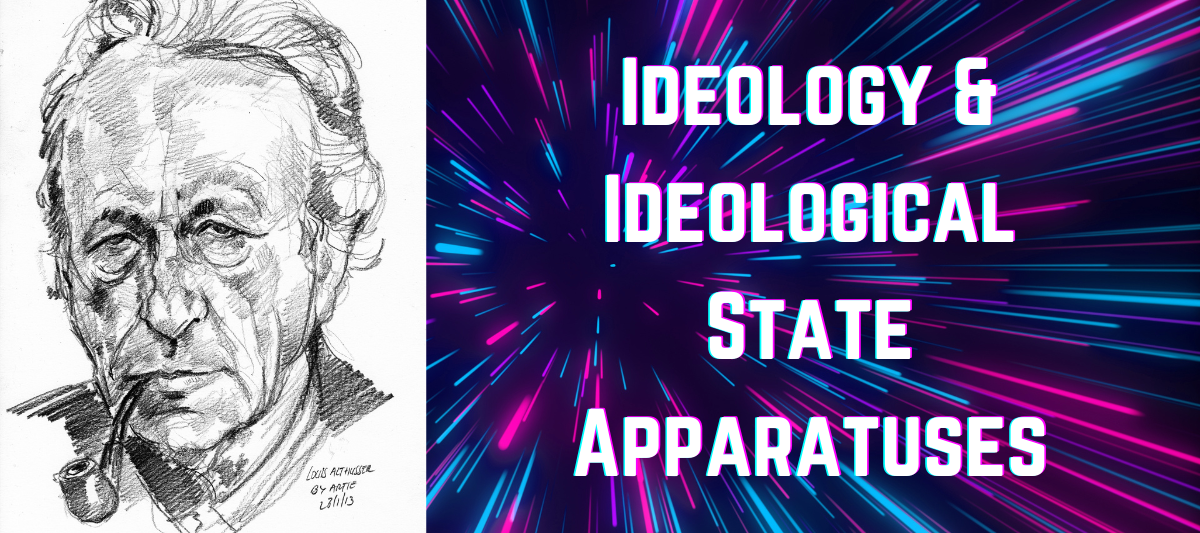
Althusser’s “Ideology and Ideological State Apparatuses (Notes Towards an Investigation)” is a part of a larger essay “On the Reproduction of Capitalism” which was included in “Lenin and Philosophy and Other Essays”, published in 1970. It is one of the most important essays on Marxism.
In the very beginning of his essay, Althusser introduces the Ideological State Apparatuses (ISAs), a concept that along with the Repressive State Apparatuses (prisons, courts, army, police etc.) constitutes and perpetuates the State power. In order to understand how the state comes and remains in power, one must understand both - the Ideological State Apparatuses as well as the Repressive State Apparatuses.
He then proceeds to introduce and explain ideology, and how we are all subjects continuously shaped and controlled by it even when we feel that we are free. According to Louis Althusser, it is crucial to objectively understand how ideology works but is nearly impossible to do so because we all function within ideology without even realising it.

Section I: The State Ideological Apparatuses
Understanding the Ideological State Apparatuses (ISAs) & the Repressive State Apparatuses (RSAs)
In the opening of "Ideology and Ideological State Apparatuses", Althusser highlights that a state remains in power through both the Repressive State Apparatuses (RSAs) and the Ideological State Apparatuses (ISAs).
According to the Marxist theory, the State Apparatus only includes- the Government, Army, administration, police, prisons, courts etc. Althusser refers to these as Repressive State Apparatus. This is because these apparatuses ultimately operate and control through physical violence.
However, along with the RSAs, there exists another reality that is not as visible. It is known as the Ideological State Apparatus (ISAs) and it is distinct from the repressive state apparatus. The ISA includes seven major components:
- Religion/religious institutions such as the Church, temples etc
- The educational system
- Family
- Legal and political system
- Trade union
- Communications - press, radio, television
- Culture - Literature, Arts, sports etc.
Differences between the Ideological State Apparatuses and the Repressive State Apparatuses
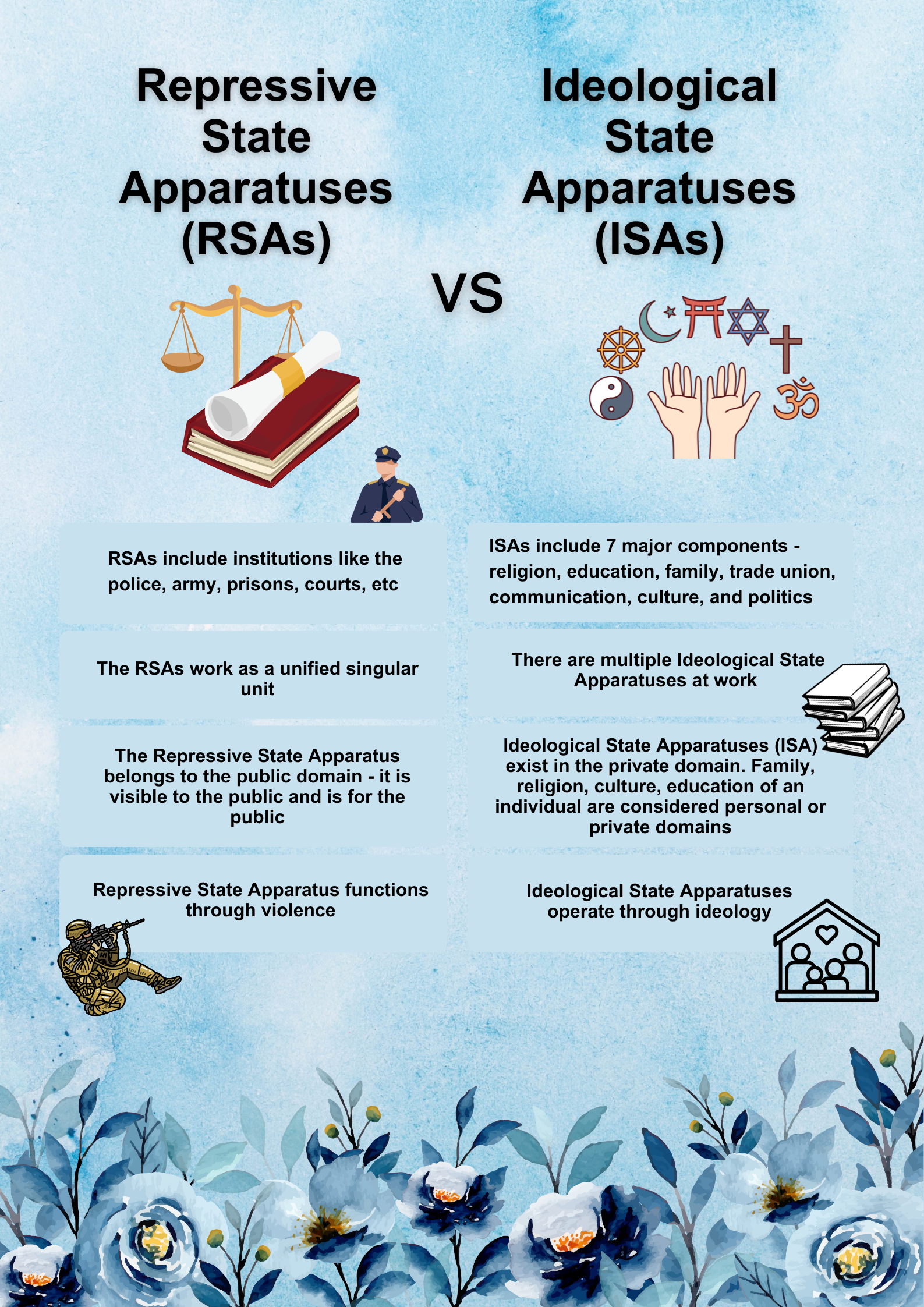
Althusser now attempts to explain the differences between the Ideological State Apparatuses and the Repressive State Apparatuses.
- While there is one Repressive State Apparatus, there are multiple Ideological State Apparatuses at work and they are not visible immediately.
- The Repressive State Apparatus belongs to the public domain - it is visible to the public and is for the public. On the other hand, the Ideological State Apparatuses (ISA) exist in the private domain. Family, religion, culture, education of an individual are considered personal or private domains.
- Most importantly, the Repressive State Apparatus functions through violence whereas the Ideological State Apparatuses operate through ideology. In fact, every state apparatus, be it repressive or ideological, operates by ideology. However what makes them different is that the former functions primarily or eventually through repression (physical), and uses ideology only as a secondary tool. For example, let us think of the army. The main function of the army is to control or function through actual physical force, by actually going to war. When we institate army to control a mob, it means that we are controlling people through brute force. The fact that we listen to the army, or consider it as a reliable and valuable institution is because of the ideology. Ideology enables the army to perpetuate and reproduce within the society.
- The Ideological State Apparatus works primarily through ideology. Interestingly, it uses repression only ultimately and in an extremely concealed way. For example, in a school children are taught to listen to authority, thereby conditioning them to become obedient subjects. If the pupil disobeys, then violence might be employed as ‘disciplinary actions’ (suspension, expulsion, etc).
Thus, both the Repressive State Apparatuses and the Ideological State Apparatuses function together. We are controlled through both repression and ideology.
The Ideological State Apparatuses (ISA) are diverse but their functions are unified by a singular ideology which is the ideology of the ruling class. It is the ruling class that holds the state power. Therefore, it not only has the Repressive State Apparatuses at its disposal but is also active in the Ideological State Apparatuses (ISA). We must remember that the ISA always functions and employs the ruling ideology. In the essay "Ideology and Ideological State Apparatuses", Althusser states:
“no class can hold State power over a long period without at the same time exercising its hegemony over and in the State Ideological Apparatuses.”
Therefore, the Ideological State Apparatuses is not just something that is at stake for the ruling class, but is also the site of bitter class struggle.
Ideological State Apparatuses (ISAs) as the site of class struggle
To maintain its power, the ruling class needs to hegemonise both- the Repressive State Apparatuses as well as the Ideological State Apparatuses. Being in power gives them the immediate control of the RSAs. However, the ISAs become a site of class struggle.
Let us try to understand this with a few examples.
Example 1: Class struggle in the Advertising Industry (An Ideological State Apparatus)

The advertising industry in India is an important Ideological State Apparatus. It can influence and even shape our societal values, desires, and consumer behaviours. Conventional advertising promotes ideologies of consumerism, success, and lifestyle aspirations. This directly dictates how we perceive ourselves in society. For instance, owning an iPhone is considered a symbol of financial superiority and is bought by the majority due to the superior connotations that accompany the brand.
Within the advertising industry there is a constant class struggle.
While the ruling class advertises and encourages consumerism, the oppressed class promotes sustainable consumption that would minimise or control hyperconsumerism. They would encourage and advertise buying from local sellers and will highlight the impacts of reckless consumerism. This challenges the ideologies of the ruling class.
The ruling class of corporate moguls and business tycoons would want to promote consumerist ideals that encourage spending and brand loyalty because this will align with their interests and will help them perpetuate their influence and economic power. Thus, advertisements of all high-end brands
Food for Thought!
We live in an age where everything is available with a click of a button. Hyper Consumerism is at its peak with companies that promise consumers delivery within minutes. While online shopping and fast fashion has become extremely convenient, access to sustainable, long lasting alternatives is relatively more expensive, and not as easily available to the masses.
How does this happen? Most importantly, whom does it actually benefit? Do you notice the power of advertisement in this case?
Example 2: Class Conflict in Religion as an ISA - Conventional Religious Institutions vs Progressive Religious Movements
Religion and religious institutions such as the churches, temples, mosques, and gurdwaras are pivotal in not only shaping people’s moral values but also shaping their cultural practices.
For instance, most festivals have a religious significance - Diwali celebrates the return of Lord Ram to Ayodhya, Christmas celebrates the birth of Jesus Christ, and Eid al-Fitr marks the end of a month-long fasting and prayer called Ramadan.
Religion infiltrates every aspect of the society - literature, dance, music, architecture, language, and social norms and behaviours.
The dominant conventional religious practices attempt to uphold and preserve caste and gender hierarchies. On the other hand, a progressive religious movement attempts to promote social justice and equality. They challenge the conventional notion of social hierarchies and discrimination. For example, advocating the inclusion of marginalised Dalits, reinterpreting religious texts to promote justice and equality - such practices challenge the conventional notion of religion.
Therefore, any reform movement that challenges traditional religious practices can be seen as an example of class conflict.
Example 3: Cinema as a sight of class struggle

Cinema is another important Ideological State Apparatus as it influences our behaviour and values. For example, Bollywood movies that involve strong female characters such as Dangal, Pink, Thappad, and Queen, challenge and impact societal expectations from women. They promote women empowerment.
Mainstream Cinema vs Independent and Regional Cinema
Since cinema is an Ideological State Apparatus (ISA), it is a site of class conflict. While mainstream Bollywood produces movies that reinforce traditional values, consumerism, aspirational lifestyle, casts popular actors and celebrities, and creates movies that align with global entertainment trends, regional or independent cinema explores diverse narratives.
While the mainstream cinema industry prioritises commercial success, independent and regional cinema emphasise artistic expression and social relevance over commercial success and popularity. In this way, it also gives opportunities to underrepresented voices. They are more likely to throw light on unexplored narratives, address social issues that are rarely talked about, and represent marginalised communities.
The ruling class can easily and immediately acquire the repressive state apparatuses. However, this is not the case with the Ideological State Apparatuses. The ruling class cannot immediately transform and utilise ISAs to their advantage. This is because the existing and unifying ideology of the ISAs is that of the former ruling class, and has been so for a long time. Additionally, the resistance of the exploited classes also express themselves in the Ideological State Apparatus. The people from the lower classes or the oppressed groups can challenge the new ruling class by:
- Highlighting the inconsistencies, injustice and flaws in the dominant system to undermine its legitimacy.
- Securing prominent and important positions within institutions to promote alternative ideas or values.
According to Althusser's "Ideology and Ideological State Apparatuses", ideology is not just a set of ideas, beliefs or values held by us. It is embedded within societal institutions and our everyday activities. Ideology is manifested through concrete institutions and their practical operations.
The Power of Ideology
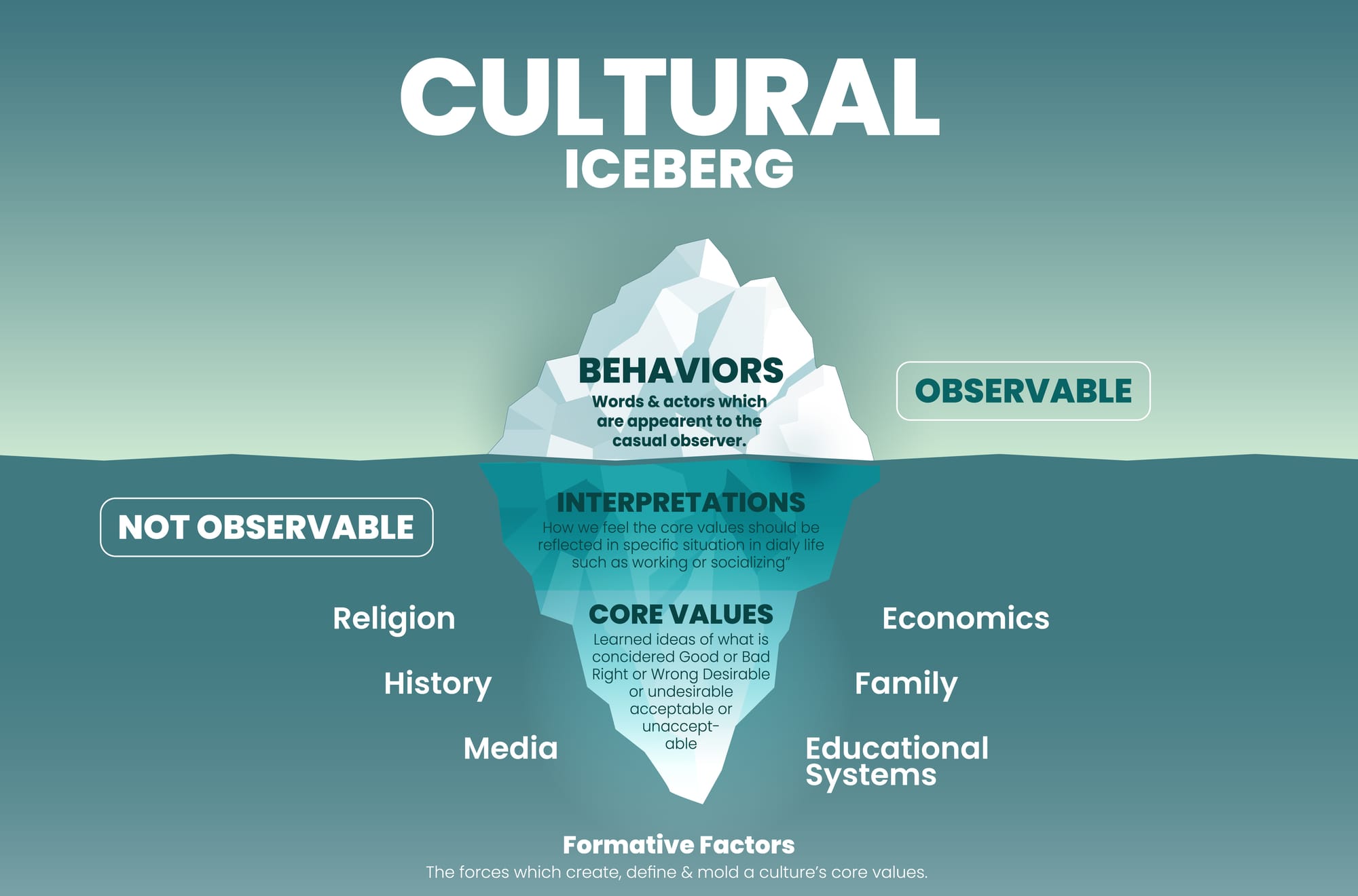
Every individual thinks that they have a consciousness and beliefs, and the freedom to act according to them. However, according to Althusser, it is not true. Almost all our belief systems are shaped by an ideological framework. Thus, when we freely believe in ideas like God, Duty or Justice, we become ‘subjects’ to a particular ideological framework. Once we adhere to an idea or belief system, they reflect in our behaviours, choices, decisions, and every day activities. For example, if you believe in God, you will become a religious person who attends church, temples, or mosques, etc, and practises religious rituals. Similarly, if you believe in Justice, you will obey the laws and will report any violation. Someone believing in duty will automatically follow social and ethical principles.
Any deviation from it is seen as morally/ethically wrong. In most ideologies, individuals are not only expected to adhere to a specific belief system, but are also expected to remain consistent throughout their lives. Any deviation is seen as an ethical flaw. This is because a deviation in an individual’s behaviour indicates that they also believe in something contrary, something that might challenge the established ideology.
According to Althusser, our beliefs and ideas exist, and are visible in our actions. Our actions are, and become practices which are dictated by rituals. And rituals exist ‘within the material existence of an ideological apparatus’.
“I shall therefore say that, where only a single subject (such and such an individual) is concerned, the existence of the ideas of his belief is material in that his ideas are his material actions inserted into material practices governed by material rituals which are themselves defined by the material ideological apparatus from which derive the ideas of that subject.”
Let us try to understand this with an example - we believe that marriage is a union of two people and families. This belief is then reflected in the actual action and the practices of getting married. In the case of Hindus, this practice is dictated by the Hindu wedding rituals such as the exchange of garlands, prayers, etc. All these rituals are defined by the Institution of marriage - an Ideological State Apparatus (ISA) which in turn generates the idea that it is a holy union of two people.
According to Althusser, each individual acts according to an ideology which exists in an Ideological State Apparatus (ISA). The Ideological State Apparatuses have certain rituals that are practised by people and are a part of their lifestyles. Thus we can conclude -
- All practices and actions by an individual are a part of an ideology. There is no practice except by and in an ideology.
- Ideology is by the subject and for the subjects

Section II: Interpellation of Individuals as Subjects through Ideology
The second section of "Ideology and Ideological State Apparatuses" arrives at Althusser's central thesis - ideology continuously and invisibly interpellates individuals into subjects. As mentioned earlier ideology is for the subjects and by the subject. An ideology cannot exist without a subject. Althusser also points out that even though ideologies might change with time, the concept of ideology does not change, and is timeless.
Something that is obvious is because of the elementary ideological effect. One of the most important characteristics of ideology is that it can impose, without appearing to do so.
For example the notion that a White man is obviously superior, the Brahmins are obviously more pious, the women are obviously better homemakers, heterosexual relationships are obviously the only natural relationship, etc.
We do not recognise this imposition and consider it the truth.
Althusser has already emphasised that the subject is compulsory for all ideologies to exist. However, he also points out that the concept of subject is important for ideology because ideology works by creating individuals as subjects. This means that ideology operates in a two-way process:
- The subject is central to ideology
- Ideology works by turning individuals into subjects who have roles within the ideological framework.
Let us understand this with an example.
Consider the concept of religion and a believer. The ideology of religion will only exist if there will be individuals who will be willing to believe in religion. So, the moment you say you believe or practise hinduism, you become a subject of the religious ideology.
Now, there will be some rituals and practices within a religious ideology such as prayers, fasting, chanting, etc. If you are a religious “subject”, you will be expected to partake in certain religious activities like going to the temple, church, or mosque (whatever the religion you follow), fasting, celebrating religious festivals, etc. These regular practices further reinforce your identity as a religious subject. The ideology now begins to dictate who they are and what they must do (following a certain ritual, their concepts about God).
From this example we can clearly see how this is a two-way process:
- The ideology needed an individual to interpellate them into subjects who would willingly listen and believe in religion.
- Once an individual is a subject, it then reinforces them as believers through its rituals and practices that infiltrate everyday actions in their lives. Ideology then begins to dictate what they believe, how they act, and how they live their lives.
Another example that we can consider is that of the citizen.
Legal ideology depends on the concept of a citizen - an individual who abides by laws, policies, pays their taxes and participates in civic life. A legal system cannot exist without individuals who believe and abide by it. In this case too, the legal ideology works in two way process:
- Since the beginning we are taught at home and in school about laws, concepts of right and wrongs, etc. This shapes our identities as subjects who believe in the concepts of law and justice. We begin to perceive ourselves as citizens.
- Everyday actions such as obeying the traffic rules, not participating in illegal activities, paying taxes, voting, etc further reinforce our role as citizens which is crucial to the survival of the ideology.
Althusser says that all ideology ‘interpellates’ people as subjects. Individuals are different from subjects. According to him, ideology works such that it transforms individuals as subjects through interpellation. For Althusser, the existence of ideology and interpellation of individuals as subjects is one as the same thing.
“I add that the category of the subject is only constitutive of all ideology insofar as all ideology has the function (which defines it) of “constituting” concrete individuals as subjects. In the interaction of this double constitution exists the functioning of all ideology, ideology being nothing but its functioning in the material forms of existence of that functioning.”
Althusser also points out that he who is writing, and the reader, both are ideological subjects.
He refers to Saint Paul, an important figure in early Christianity, and his statement that we live, move, and exist in the Logos, which Althusser interprets as ideology. This implies that ideology shapes every aspect of our lives and is a part of our very existence.
One of the most elementary characteristics of ideology is its “obviousness”. The fact that we are interpellated as subjects by an ideology seems very obvious and natural to us, so much so that we do not question it. However, this “obviousness” is created by ideology to keep us aligned with the system. For example, in a capitalist society, we may think that we are free if we can vote, have a job and can buy goods. However this illusion of being free is what keeps us invested and compliant within the capitalistic society without rebelling or questioning it.
Functions of Ideology
According to "Ideology and Ideological State Apparatuses", Althusser points out that Ideology has two functions:
- Ideological recognition - Ideology makes us recognise ourselves as subjects, and feel natural and obvious about it. We think that our identity as subjects is unquestionable.
- Misrecognition - Simultaneously, ideology also distorts reality by making us believe in the “obviousness” of this recognition that hides its constructed nature. Our identity is not as natural as it seems.
Let us understand this with an example.
Imagine a teacher calls out a student’s name during the class attendance. In this instance, we can witness ideology performing its dual functions of recognition and misrecognition.
The Recognition
- The teacher calls out “Vaibhav”, to which the student responds with a “Present!”.
- The moment Vaibhav responds to his name being called, he recognises himself as the subject and confirms his identity as a student.
- This act of recognition feels natural and he does not need to question it.
The Misrecognition
- In this interaction, the ideology of education is invisibly interpellating Vaibhav as a student - a subject.
- He believes that being a student is his reality. However it comes with certain expectations - attend classes, take tests and score a certain level, follow the rules of the academic institution, etc.
- It is invisible to Vaibhav that he is a part of a larger ideological framework (the school system).
Althusser points out that even if we realise and recognise how we function within ideologies in our everyday lives, we only get the consciousness of how ideology is continuously at work. It does not mean that we fully understand the mechanism of how ideology works.
In order to understand this mechanism, we need scientific knowledge - a way to analyse ideology objectively without being influenced by it. Unfortunately, this is a challenging task as we are forever thinking and working within an ideology. To break free from ideology, one would require a specific dedicated discourse.

Understanding Literary Theory
Key Takeaways…
Towards the end of “Ideology and Ideological State Apparatuses”, Althusser attempts to explain ideology and how a subject is crucial for its existence.
Ideology interpellates or hails an individual and turns them into subjects. An individual is different from a subject. While an individual is just a biological living human being, a subject is someone who is shaped and recognised by ideology, an individual who has an identity within the Ideological State Apparatus.
Ideology transforms an individual into a subject in a way that looks extremely natural and unquestionable. It is almost impossible to recognise an ideology at work.
Althusser also points out that everything that occurs within the ideology might seem to occur outside it. This causes people to believe that they are acting beyond ideology. One of the most significant characteristics of ideology is that it denegates its ideological character through ideology. Ideology never admits, “I am ideology.” It disguises itself as "truth" or "common sense." You will hardly hear someone accept that they are according to an ideology. Acting within an ideology is mostly applied to other people.
Thus, Althusser points out - ‘ideology has no outside (for itself), but at the same time that it is nothing but outside (for science and reality)’.
To recognize how ideology works, one must critically analyse it from a scientific perspective, such as Marxism. Most people, however, remain within ideology and don’t realise its influence.
Louis Althusser then concludes “Ideology and Ideological State Apparatuses” by saying that Ideology works by "hailing" or interpellating individuals, turning them into subjects. Since ideology is eternal and doesn’t operate in a linear or time-bound way, we must understand that this process of interpellation has always been happening.
This implies that individuals are always-already subjects—they are born into a world where ideology pre-exists and shapes their identity and role. Therefore, individuals don’t exist outside of ideology; they are abstract compared to the subjects they are continually being shaped into.

Althusser's theories over the years
Understanding Althusser’s works and the evolution of his theories might help you get a better grasp of his “Ideology and Ideological State Apparatuses”.
The Earlier Stages - 1940s to 1960
Althusser and Hegel
Althusser's earlier works dealt with Hegel and in 1947 he wrote a thesis “On Content in the thought of G.W.F. Hegel”. He criticised the oversimplification of Hegel’s dialectic and believed that it must not be criticised for its form. Instead it must be criticised as the contents in the form were unable to realise the absolute idea.
In his “The Philosophy of Right”, Hegel had applied dialectics to the Prussian state and had considered it to be on the verge of an ideal society. For him, the existing Prussian state was the fulfilment of the dialectical idea. However, for Althusser, this fails the transformative promise of the dialectic. This is because instead of envisioning further progress, Hegel considered the Prussian state as the possible endpoint and the absolute stage of human freedom. This limits his own dialectic to further critique and transform society and reduces it as a tool that justifies the current state.
Althusser used Marx’s “Critique of Hegel’s Philosophy of Right” to criticise Hegel and agreed with him that the Hegelian concept must be realised in the actual world. However, he also argued that Marx made the same mistake as Hegel. According to Althusser, just like Hegel, Karl Marx too assumed that historical developments will automatically fill the dialectical promise. This is problematic because Marxism believes that history will inevitably evolve in socialism and communism. This belief passively assumes that socialism is the dialectical ideal that requires no further critique or transformation.
According to Althusser, even though both Hegel and Marx believe that history will naturally lead to the culmination of the dialectical process, it is not enough. For him historical resolutions do not necessarily result in a reconciled human totality. Our knowledge is shaped by historical contexts and is therefore not absolute or reliable. We cannot solely rely on historical developments to attain the dialectical ideal. Instead of a complacent reliance on historic developments, active engagement and critique are crucial to social progress.
Althusser and Karl Marx
Initially, Althusser had believed that Marxism was Hegelian who believed in human fulfilment. However, that changed by the 1950s when he began to realise that Marx’s philosophy was distinct from Hegel’s. This reflected in his short essays written on Marxist philosophy in 1953. In these essays Althusser aligned himself with Lenin and Mehring that after a certain point, Marx left behind Hegel’s philosophy and created his own methodology and theory. He also insisted that Marx reversed the Hegelian dialectic. His essays at this time were very much in line with the French Communist Party.
Besides this, Althusser spent the rest of the decade focusing on theorists who preceded Marx - Montesquieu and Feuerbach.
Althusser and Marxism in 1960s
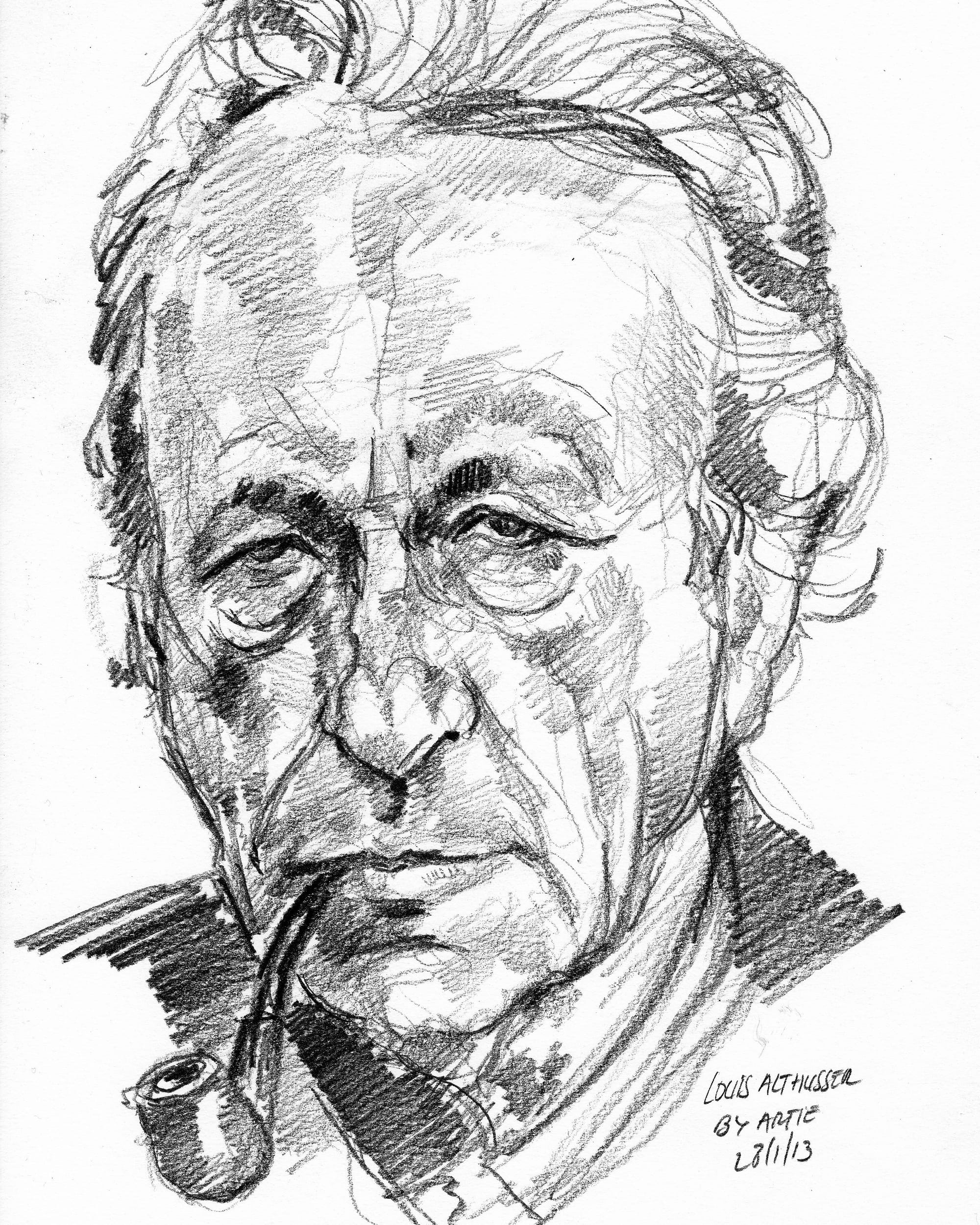
Louis Althusser By Arturo Espinosa CC BY 2.0 Wikimedia
During the late 1950s, several European intellectuals began to seek alternatives to Marxism Leninism and explored Marx’s core essence and philosophy. In this quest, they returned to his earlier works before 1945.
In the 1960s, Althusser focused on the ways he could employ the Marxist philosophy to resolve problems in diverse areas of metaphysics, epistemology, hermeneutics, historiography, etc.
He wrote “On the Young Marx: Theoretical Questions” in 1961. This work was Althusser’s first public intervention into Marxist philosophy. He argued that Marx had originated a new philosophy known as Dialectical Materialism which was different from both Hegel and Feuerbach. Additionally, he also believed that Marx had founded a new science called Historical Materialism.
In 1965, Althusser wrote a collection of essays “For Marx” and seminar papers, “Reading Capital” that further described the Marxist philosophy (Dialectical Materialism), and science (Historical Materialism).
Althusser’s Hermeneutic Theory
Althusser argued against the two popular empiricist understandings of Marx- the humanist Marxism and the Marxist-Leninist theory. He employed a symptomatic reading of Marx's texts. According to him it was futile to return to Marx’s earlier works or to think that only certain passages or works held his core philosophy. Althusser believed that Marx’s core philosophy and essence was implicit in his works before 1845, and that they were saturated with Hegelian and Feuerbachian concepts. However, this did not mean that reading his works written after 1845 will be sufficient for truly understanding him.
Thus, in his “For Marx” and “Reading Capital”, Althusser focuses on unearthing the ideological frameworks Marx was writing in, but was unaware of. This was an alternative reading to popular empiricist understandings of Marx that believed that true knowledge of an object is gained through observation and abstraction
According to Althusser, true knowledge cannot be acquired by simply observing raw and brute facts. Instead, it is produced through a disciplined scientific process that involves specific methods, and theories. This does not mean that scientific knowledge is not acquired through facts, but by facts shaped by pre-existing concepts that carry ideological baggage. For example, unemployment is not a brute fact acquired simply by observation but is created by a social and economic framework. According to Althusser, the job of science was to take factual concepts that are shaped by ideology and strip the ideological elements away. This transition from ideological to scientific is known as ‘theoretical practice’. The moment of shift from the ideological concepts to the scientific ones is known as epistemological break. It is the theoretical practice that leads to scientific knowledge.
For example, Galileo Galilei replaced the religiously influenced views of the universe (facts that were steeped in ideology) with scientific understanding based on both observation and mathematics.
Similarly, according to Althusser, Karl Marx also replaced classical economic ideas developed by thinkers like Adam Smith and David Ricardo that were ideologically shaped by the values of capitalism, individualism and private property. Instead, Marx developed an approach that was grounded in tangible material conditions instead of abstract ideals. This was known as Historical Materialism.
Althusser on Marx’s Idea of Modes of Production
According to Althusser, Marx’s concept of ‘mode of production’ helped theorists understand how we materially produce ourselves - knowledge, environments, histories and ourselves. For him Marx’s idea of ‘mode of production’ was beyond economic activities. It could be applied to:
- Ideological Production
- Political Production
- Philosophical Production
Each mode of production impacts, shapes and supports the other and is a part of a complex whole.
For Althusser, the basic insight of Marxism is that each mode of production uses labour or forms of labour to transform existing materials into new products. For example, in a scientific production, scientists use existing theories and discoveries to generate new knowledge. Similarly, in an economic production, the workers transform raw materials into new finished goods.
Interestingly, Althusser also deviated from the popular economist understanding of Marx. He argued that each mode of production could only be understood according to its unique structure and one cannot understand all modes of production by learning about one. Thus, for him even though all modes of production impact each other and form a complex whole, they are unique and cannot be reduced and simplified as a sole cause of the other.
What was Marxism for Althusser?
After re-reading Marx’s works, Althusser considered Marx’s philosophy the same as the theory of Dialectical Materialism. He believed that Marx’s Historical Materialism could employ dialectical materialism to understand the modes of production better and recognise any opportunities of political change that these modes presented. He also emphasised on the concepts of structural causality, contradiction, and structure in dominance
Althusser introduced the term “structural causality” which meant that each individual productive process is shaped by and impacted by a complex structured whole. None of these individual processes are simple or an essential prerequisite of another.
Althusser also highlighted the concept of “contradiction” that could be used by a historical materialist scientist to understand the modes of production. According to the concept of “contradiction”, several practices take place within a specific mode of production that may or may not be tensions among these practices. Within a single mode of production, not all elements develop at the same pace or follow a similar logic. For example, we do live in a capitalistic society but sectors such as public healthcare operate on relatively socialist principles.
Althusser was often criticised for offering his inputs about Marx by ignoring what he actually wrote. Thus, in the 1960s and 1970s, Athusser revised his take on the relationships among science, philosophy, ideology, and politics. This revisions were Althusser’s attempt towards developing a materialist political philosophy apt for political practice.
He organised a seminar at the ENS in 1967 which resulted in a series of papers gathered together in “Philosophy and the Spontaneous Philosophy of the Scientists”. Here Althusser abandoned his previous claim that certain levels of theoretical practice were autonomous and divorced from ideology. He now believed that all theoretical concepts are influenced and shaped by ideology.
During the 1970s, Althusser further elaborated his Marxian ideas, and it was during this time that he came up with the concept of ‘ideological interpellation” which he finally discussed in “Ideology and Ideological State Apparatuses”.

List of Althusser's Works
Besides "Ideology and Ideological State Apparatuses", Althusser also wrote the following influential works.
- The International of Decent Feelings (1946)
- On Content in the Thought of G.W.F. Hegel (1947)
- Montesquieu: Politics and History (1959)
- On the Young Marx: Theoretical Questions (Written and published in 1961)
- Contradiction and Overdetermination (Written and published in 1962)
- Marxism and Humanism (Written in 1963, and published in 1964)
- Freud and Lacan (Written and published in 1964)
- For Marx (Written during 1961-65, and published in 1965)
- Reading Capital (Published in 1965)
- A Letter on Art in Reply to André Daspre
- Lenin and Philosophy (Written and published in 1968)
- Ideology and Ideological State Apparatuses (Written and published in 1970)
- Elements of Self-Criticism (Published in 1974)
- Philosophy and the Spontaneous Philosophy of the Scientists (Published in 1975 and translated into English in 1990)
- Machiavelli and Us (Written in 1972 and published in 1975)
- The Future Lasts Forever: A Memoir (Written in 1985, and published in 1992)
Althusser's "Ideology and Ideological State Apparatuses" is one only among the most important essays on Marxism, it is also one of the most influential and groundbreaking essays that completely transforms how we perceive the world around us.
References
Althusser, Louis. Lenin and Philosophy, and Other Essays; London] New Left Books, 1971
Barry, Peter. Beginning Theory: An Introduction to Literary and Cultural Theory. 1995. 4th ed., Manchester University Press, 2017
Lewis, William. “Louis Althusser (Stanford Encyclopedia of Philosophy).” Stanford.edu, 2009, plato.stanford.edu/entries/althusser/
Read More on Theory
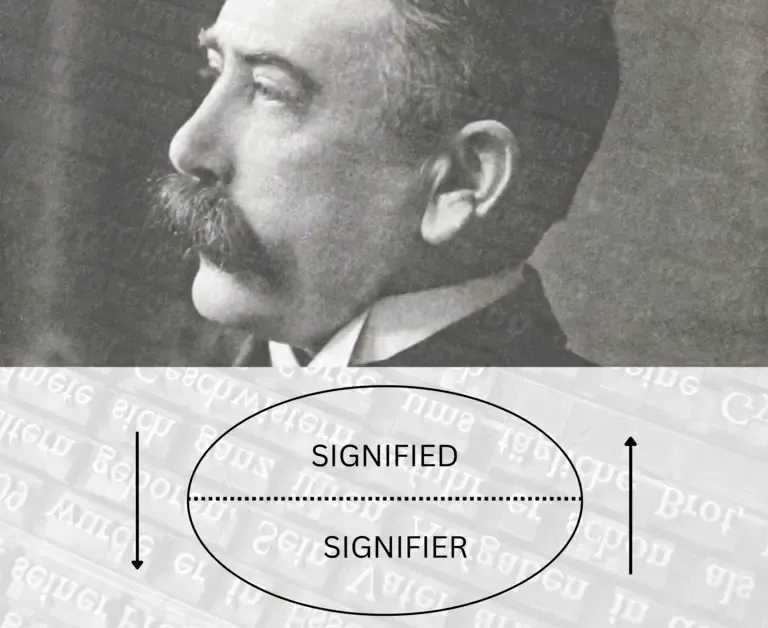
Nature of the Linguistic Sign

Towards a Feminist Poetics by Elaine Showalter
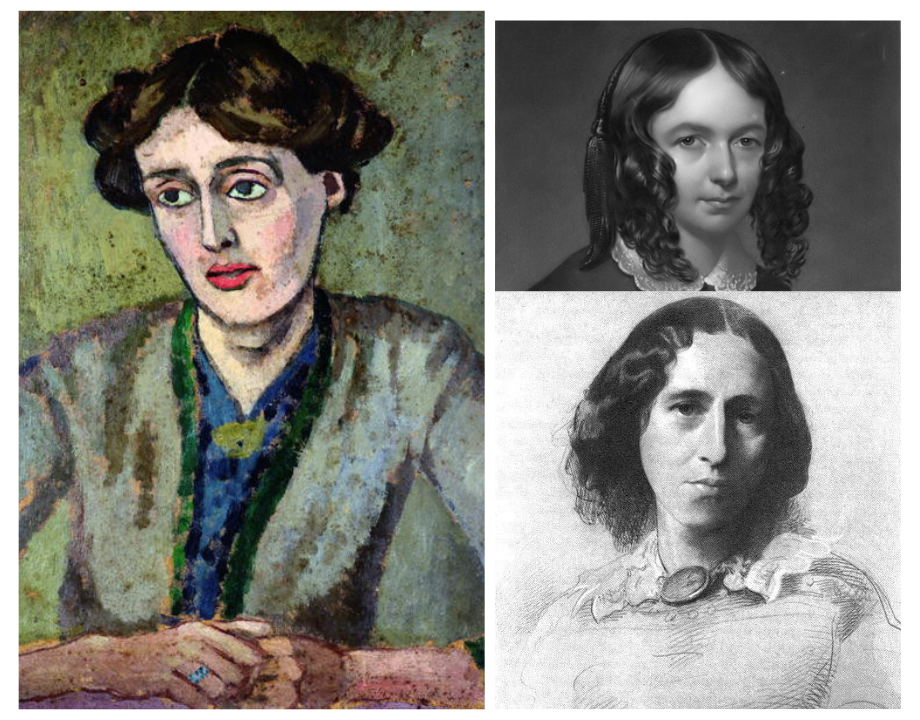
Gynocriticism
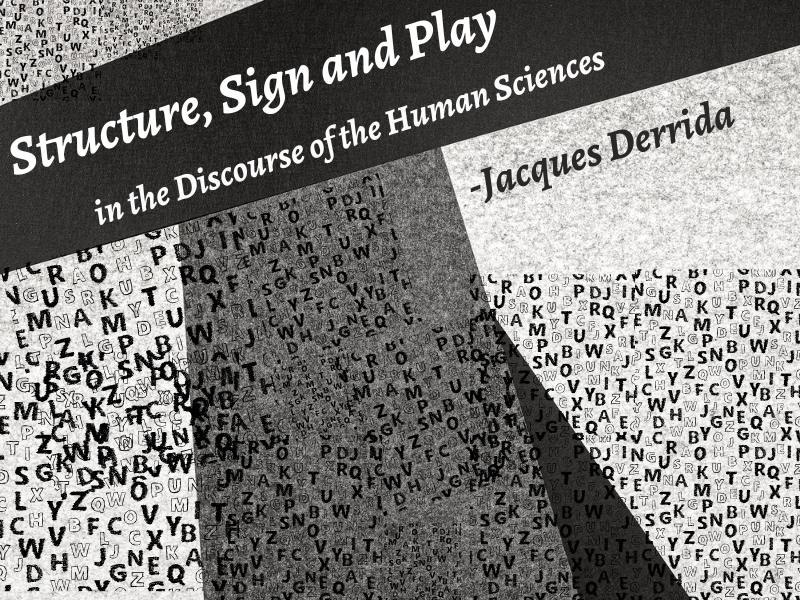
Derrida's Structure, Sign and Play
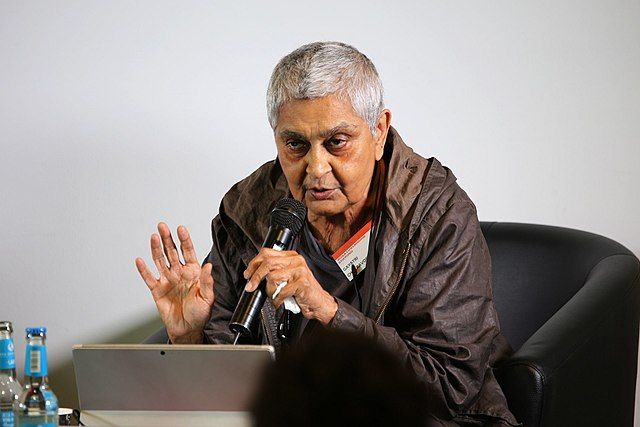
Strategic Essentialism






